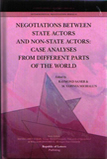Negotiation & Diplomacy
Studying cross-border regions requires an interdisciplinary approach consisting of among others micro-economics (competitive firm behaviour, local labour markets), spatial economics (rural and urban planning and architecture), policy analysis (regulatory function of government), urban geography (migration patterns), institutional sociology (administrative culture), social psychology (social cohesion) and cultural anthropology (comparative religion and values).
Scholars from different academic disciplines have studied conflict and negotiations over the past centuries going back to ancient times2. This holds not only for Western societies but for the world at large. Whether highly developed with codified norms and written rules or nomadic and based on narrative culture, societies tried to make sense of conflict and attempted to develop conflict resolution methods.
Global Economic Governance from the Perspective of a "Small State" - Economic Diplomacy of Switzerland
Published by the Economic Diplomacy Programme, SAIIA, Occasional Paper, No 124, November 2012.
Accessible at Website
This annotated bibliography covers those publications analyzing the link between Culture and International Negotiations. A special focus on WTO and Trade-related Negotiations was adopted while doing the literature selection.
A total of 32 publications available from the public domain were selected. They comprise books, articles in specialized journals and electronic sources. Publications selected and annotated are relevant for researchers interested in conducting further studies on Culture and International Negotiations as well as Culture and Multilateral Trade Negotiations.
NEGOTIATIONS: Contributions by Scholars from Social and
Economic Sciences, Raymond Saner, 2010, Diplomacy Dialogue, CSEND
 Today's world has gone beyond state-to-state negotiations. While these traditional forms of engagment still exist, the more rapid developments have occurred at the boundary of social and political conflicts. The State's strict jurisdiction over diplomacy as a tool for conflict resolution is being increasingly challenged by economic actors and civil society actors. This new overlapping of convergent and divergent interests between these multiple actors is the focus of the book.
Today's world has gone beyond state-to-state negotiations. While these traditional forms of engagment still exist, the more rapid developments have occurred at the boundary of social and political conflicts. The State's strict jurisdiction over diplomacy as a tool for conflict resolution is being increasingly challenged by economic actors and civil society actors. This new overlapping of convergent and divergent interests between these multiple actors is the focus of the book.
Saner, R.; “O negociador experiente". Senac (Editors),
Sao Paulo, Brazil, 2002.
Saner, R.;“Zur Kultur eines Berufs: Was ist ein Diplomat?”. Auswärtiges
Amt- Diplomatie als Beruf, Brandt/Buck (Hrgs.), pp. 333-339. Leske & Budrich, Opladen 2002.
Saner, R.; “El Experto Negociador”. Paul Haupt Verlag (Editors), Los
Amigos del Libro, Bolivia, 2002.
Saner, R.; Yiu, L.; “External Stakeholder Impact on Third-Party Interventions in Resolving Malignant Conflicts: The Case of a Failed Third-Party Intervention in Cyprus”. International Negotiation, Vol. 6: 387-416, 2001.
Saner, R.; Becerra, M. (editors); "Trade Negotiations Cases, Analyses, Strategies at Bilateral, Regional and Multilateral Levels: Bolivia 2001", (English and Spanish), Los Amigos del Libro, La Paz, 2001
Saner, R.; Jauregui, S; Yiu, L; "Climate Change and Environmental Negotiations: Global and Local Dynamics"; Los Amigos del Libro, La Paz, 2001.
The objective of this paper is to focus on one aspect of European regional integration which has been given insufficient attention so far by scholars and policy analysts alike. In particular, the question which this articles attempts to answer is how to nurture the development of sustainable trans-border regional cooperation and trans-border integration. The large majority of existing regional studies focus on competitiveness of intra-national regions like Baden-Würtemberg (South-Western Germany) or Lombardy (Northern Italy).
Saner, R.; Maidana, I; "Trade Negotiation Case, Analyses, Strategies at
Bilateral, Regional and Multilateral Levels: Bolivia 2000", Los Amigos del Libro, La Paz, 2001.
Saner, R., Yiu, L., Sondergaard, M.; "Business Diplomacy Management: A Core Competency for Global Companies". Academy of Management Executive, Vol. 14 (1), February, 2000.
Wahl, U., Saner, R.; "Zur Verhandlungstechnik- Ueber Strategien und Taktiken". Index- Fachmagazine Betriebswirtschaft, Vol. 3, 1998.
Saner, R.; “Verhandlungstechnik”. (in German), Paul Haupt Verlag, Berne, 2008 (2. Auflage)
“Socio-Economic Foundations of a Just Society”, Special Report from the 1996 Conference of the Society for the Advancement of Socio-Economics, Centre for Socio-Eco-Nomic Development. Geneva. 1996.
Saner, R., Yiu, L.; “Conflict Handling Styles in Switzerland- Some Preliminary Findings & Initial Interpretations”. Die Unternehmung, Vol. 2, 1993.
Beyond the public's occasional glimpse of the work carried out by the International Committee of the Red Cross (ICRC) lies an untold story of human vulnerability that is largely unresearched. The informed public generally admires ICRC's 125-year history of caring for the war wounded, of protecting the lives of prisoners of war, and of providing relief to civilian populations affected by armed conflicts...
